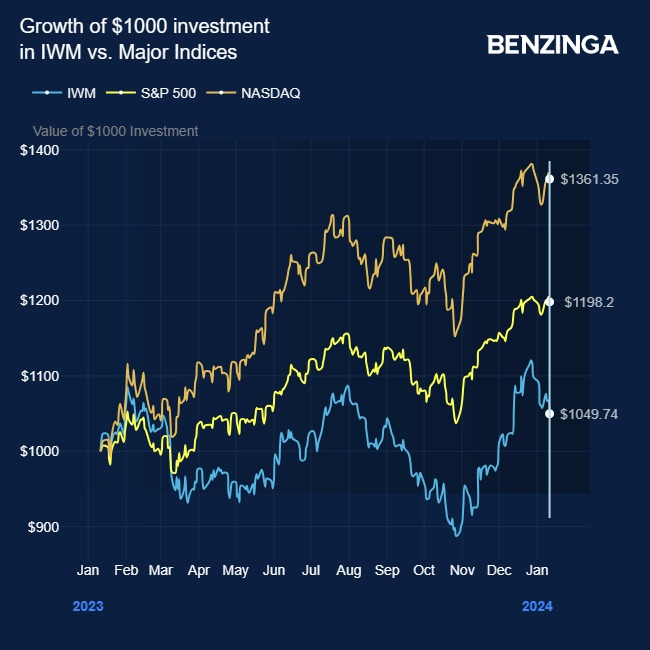Zinger Key Points
- Inflation exceeds expectations, diminishing prospects of March Fed rate cuts.
- Economists skeptical as stock markets react negatively to unexpected inflation rise.
- Don't face extreme market conditions unprepared. Get the professional edge with Benzinga Pro's exclusive alerts, news advantage, and volatility tools at 60% off today.
Inflation overshot expectations in December and raised the question of whether the Federal Reserve’s dovish pivot at its last policy meeting might have been too soon.
It’s been a tough slog for the Fed to get inflation back down to its 2% target and, as long distance runners know, it’s always the last mile that hurts the most.
In December, the annual headline rate of consumer price inflation (CPI) rose to 3.4%, up from November’s rate of 3.1%. Economists had predicted a rise, but only back up to 3.2% — and this was expected to have been just a temporary blip.
Stock Indices Fall
Market reaction was negative, with all major indices showing opening losses. The SPDR S&P 500 ETF SPY, an exchange trade fund that tracks the S&P 500 Index, was down 0.8% in midday trading.
Worst affected was the Russell 2000 Index of small cap stocks — a sector that comprises many companies with debt that becomes more costly to service under higher interest rates. The iShares Russell 2000 ETF IWM was down 1.8% in midday trading.

Markets Discounting March Rate Cut
So, do economists and equity market analysts believe the inflation numbers mean the Fed will stay higher for longer?
On X (formerly Twitter) The Kobeissi Letter said that following the data, prediction markets were “severely discounting a March rate cut.”
It added: “We started 2024 with a 70%+ chance that interest rate cuts begin by March. After the strong jobs report and a hot inflation reading, odds have nearly halved.
“The market is setting itself up for disappointment by pricing in six or more rate cuts this year. Can the Fed really pivot right now?”
Also Read: Inflation Rises More Than Expected To 3.4% In December, Rattling Traders Betting On Fed Rate Cuts
Sticky Service Sector And Housing Rents
Joe Brusuelas, chief economist at RSM US, said that the sticky inflationary areas remained mainly in the service sector — which increased 5% on a year-over-year basis — and in housing costs, which increased 4.8% on an annual basis, driven by rises in owner equivalent rents.
He said: “We have never been in the March cut camp and our 2024 forecast of four twenty-five basis point rate cuts starting in June stands in contrast with the current consensus which implies six rate cuts this year.”
He added: “The last mile of inflation will not be an easy one and I do not expect the Fed to ultimately get back to a 2% target on a sustainable basis.”
Ian Shepherdson, chief economist at Pantheon Macroeconomics, also noted that the biggest contribution to core inflation came from rising rents, but suggested data from online rental marketplace Zillow pointed towards a softening of this element.
“The Zillow rent numbers point to a sustained slowing in the rate of increase of CPI rents this year, but the CPI measure is much more erratic than the Zillow numbers,” Shepherdson said.
Controversial OER Metric
Back in November, Bluford Putnam, chief economist at CME Group, told Benzina that if owner equivalent rents (OER) were stripped out of CPI, the headline rate would have already dropped below 2%.
“I don't like taking things out of CPI, but this one's a fiction. So if you take it out, we're below 2%, and we've been below for three months — we're already below the Fed's target,” he said.
Oliver Rust, head of product at data aggregator Truflation, agreed that rent and housing was given too much weighting on the consumer price index, adding that this category should be reviewed to ensure its data accurately reflects the situation on the ground.
However, he added: “Even if actual inflation is slightly lower than the number reported, we believe the data is still too strong to warrant a reversal of monetary policy. We see inflation remaining sticky and the labor market staying tight, and this gives the Fed no reason to cut interest rates.”
Chris Zaccarelli, chief investment officer for Independent Advisor Alliance, was sanguine about the numbers, saying that while there might be disappointment for stock investors in the short term, the longer term fact that the Fed is done with raising rates hasn’t changed.
He said: “Whether the Fed cuts in March or in June and whether it cuts four times, three times, or only twice, shouldn't matter too much. As long as the economy stays out of recession the market will keep moving higher and we will have a positive 2024.”
Photo: Shutterstock
Edge Rankings
Price Trend
© 2025 Benzinga.com. Benzinga does not provide investment advice. All rights reserved.
Trade confidently with insights and alerts from analyst ratings, free reports and breaking news that affects the stocks you care about.